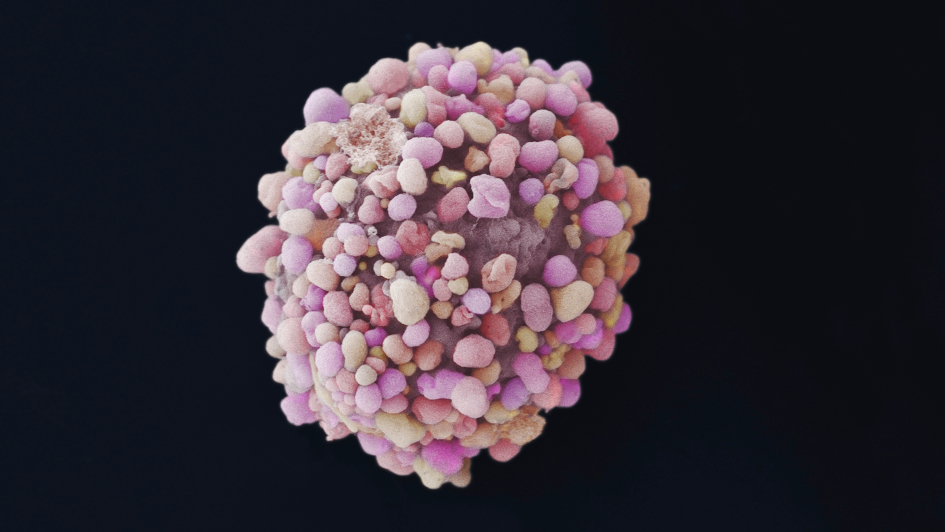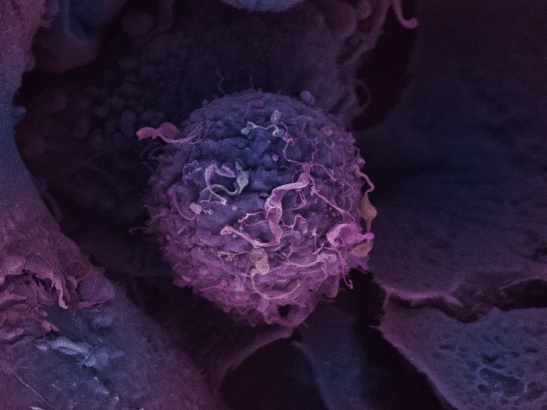
Image: Breast cancer cell
The Institute of Cancer Research, London, welcomes the news that a new targeted breast cancer drug, capivasertib, has been approved by the Medicines & Healthcare products Regulatory Agency (MHRA) for treating the most common type of advanced breast cancer.
The approval grants marketing authorisation for the use of capivasertib in combination with fulvestrant, which will be available to people in the UK with hormone receptor (HR) positive, human epidermal growth factor receptor 2 (HER-2) negative breast cancer, with one or more PIK3CA, AKT1 or PTEN-alterations following recurrence or progression on or after standard treatments an endocrine based regimen.
Tumours with mutations or alterations in the PIK3CA, AKT1 or PTEN genes are found in approximately half of patients with this form of breast cancer.
The next step will be for NICE and other appraisal bodies to meet with the manufacturer to determine whether capivasertib will be made available on the NHS.
Developing capivasertib
The approval follows similar licensing by the Food and Drug Administration in November 2023, and more recent approval by the European Medicines Agency (EMA).
Capivasertib (trade name Truqap) is a first-in-class drug that works in a new way, by blocking the activity of the cancer driving protein molecule AKT. Capivasertib was discovered by AstraZeneca subsequent to a collaboration with Astex Pharmaceuticals (and its collaboration with The Institute of Cancer Research (ICR) and Cancer Research Technology Limited).
Professor Nicholas Turner at the ICR and The Royal Marsden NHS Foundation Trust led the international phase III CAPItello-291 trial, which led to its approval. The trial was sponsored and funded by AstraZeneca.
Results from the CAPItello-291 trial showed that capivasertib doubled the time it took for cancer to progress in people with advanced HR positive, HER-2 negative breast cancer - from 3.1 months for patients who received hormone therapy alone, to 7.3 months for those who received hormone therapy combined with capivasertib.
Participants on the trial had experienced their cancer recur or progress despite standard hormone treatments, and the majority had also previously been treated with a CDK4/6 inhibitor – a class of drugs that stop cancer cells from multiplying.
In the UK, patients with advanced HR-positive HER-2 negative breast cancer are otherwise left with the option to continue to receive fulvestrant hormone therapy, which is often ineffective, or chemotherapy, a treatment which carries debilitating side effects. There is great need for new treatment options.
Targeting AKT
The development of capivasertib followed years of fundamental research at the ICR, aimed at understanding how the AKT protein is regulated. The AKT protein had been identified as an attractive target for anti-cancer drugs, due to its involvement in the growth and survival of cancer cells. In 2002, ICR scientists cracked and published the 3D structure of AKT and showed how the protein is activated.
Researchers in the ICR’s Centre for Cancer Drug Discovery, with funding from Cancer Research UK, then worked in collaboration with Astex Pharmaceuticals to design small-molecule inhibitors which would target AKT, based on its 3D structure.
In 2005, a series of prototype drug compounds discovered by the ICR and Astex was shown to have very promising activity against a range of human tumours grown in mice and was licensed to AstraZeneca. Then, in 2010, AstraZeneca announced its discovery of capivasertib, and began to develop the drug as a potential treatment for various forms of cancer.
The initial clinical development of capivasertib was centred on an early-phase trial which was led by the ICR and its partner hospital The Royal Marsden. Subsequently, phase II studies were completed in the UK in collaboration with the UK Cancer Research Network.
The trials used biomarkers that were developed at the ICR to show proof of concept that the AKT protein was inhibited by capivasertib.
Professor Nicholas Turner, Professor of Molecular Oncology at The Institute of Cancer Research, London, and Consultant Medical Oncologist at The Royal Marsden NHS Foundation Trust, who led the CAPItello-291 trial, said:
“This is a wonderful development in the treatment of the most common type of advanced breast cancer. Around half of patients with this kind of breast cancer have mutations in one or more of the genes – PIK3CA, AKT1 or PTEN, and for these patients, capivasertib provides an exciting, new targeted treatment which can keep their cancer progressing for longer.
"We hope NICE will recommend the use of capivasertib in combination with fulvestrant for patients on the NHS.”
Professor Kristian Helin, Chief Executive of The Institute of Cancer Research, London, said:
"This is fantastic news. I am thrilled that there is a new, innovative drug available for certain patients with advanced breast cancer which is no longer responding to standard treatments.
“Today’s approval is a proud moment for the ICR. Decades of research carried out by ICR scientists, and important collaboration with Astex Pharmaceuticals paved the way to the discovery of capivasertib by AstraZeneca – it’s incredibly rewarding to see the drug reach this major UK milestone.
“We hope to see capivasertib made available on the NHS, and would encourage NICE and the manufacturer to work together to make this happen as soon as possible.”
Professor Paul Workman, former Chief Executive of The Institute of Cancer Research, London, and Director of the Centre for Cancer Drug Discovery (formerly the Cancer Research UK Cancer Therapeutics Unit) at the time, and an active researcher in the AKT drug discovery project, said:
“I am delighted to celebrate this landmark moment in a long scientific journey personally, and alongside drug discovery teams from the ICR, Astex and AstraZeneca. It’s immensely gratifying that years of collaboration have contributed to the discovery and development of this new cancer drug, and I am thrilled that capivasertib now has the potential to improve the lives of patients living with advanced breast cancer in the UK."
